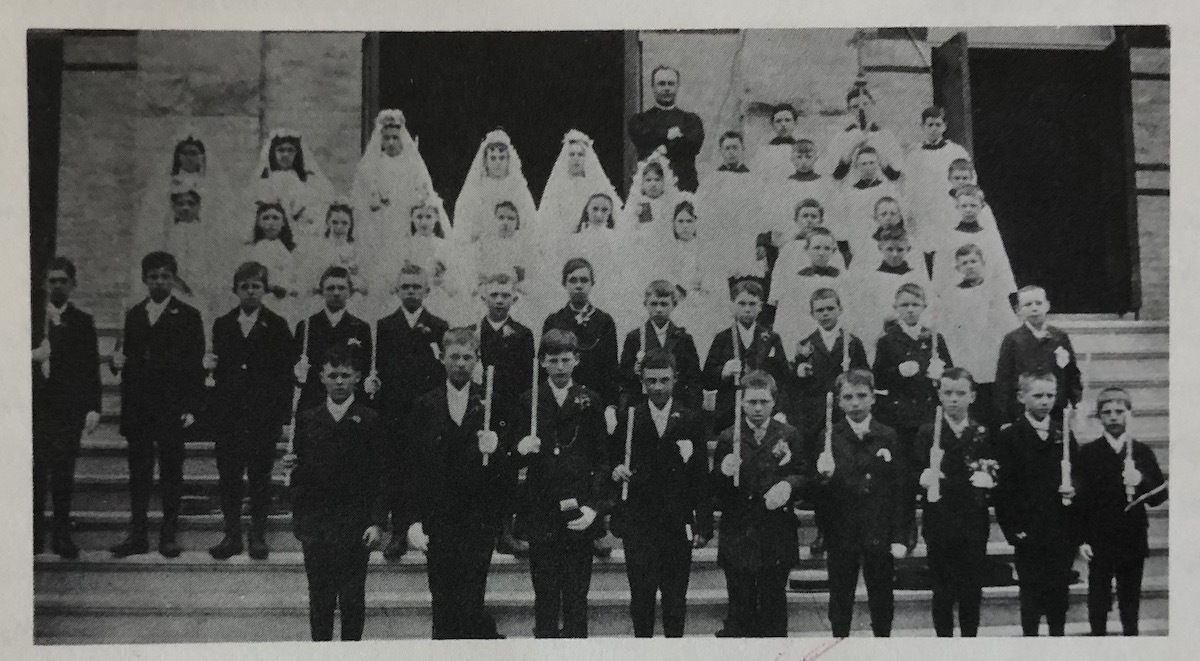Recently I rode to Stockbridge with Fr. Bob Karuhn, Fr. Ted Hendricks, and another man. We were attending the funeral of their classmate, Fr. Marty Fox, who had served at St. Joseph in Oconto from 1974 until 1983. These men were part of a class of 19 men ordained in 1965. They are now 80 years old. Some of these men were the “Pioneer” class at Sacred Heart Seminary, a boy’s high school in Oneida that opened in 1953. Their era is considered by many to be the ‘glory days’ of the Catholic Church in America. Seminaries were full, convents were full, Catholic schools were bursting at the seams. Though not all was well in the church, many speak fondly of these years.
Sacred heart seminary would close in the mid-1970’s. Nuns began to disappear in the same era, churches are closing, and vocations have slowed to a trickle. In fact, our recent Clergy Congress raised the question of how to cover Masses for the next five years. Almost one quarter of the clergy serving in our Diocese are foreign priests; they want to try and limit that number to 25%. They plan to use up to 25% parish directors, that is, deacons and Sisters and lay people who “run” a parish. They can provide pastoral care and sign checks but they cannot offer Mass or Confessions. The Diocese is proposing that priests be required to stay on two additional years after retirement and serve as Sacramental Ministers for parishes that will not have a resident priest. This move would be necessary to ensure that the parishes we currently have could continue to have Sunday Mass celebrated for the next 5 years. After that, it’s anybody’s guess.
Several people have asked me if the Pope is considering allowing married priests. They’ve heard just a snippet from the Synod on the Amazon, a gathering in Rome meant to discuss the pastoral needs in this one particular world region. Ordaining married men was one suggestion raised by some Bishops. People are hinting that married clergy might solve our vocation shortage. The Church moves very slowly on anything, so don’t hold your breath. I have a different question to pose to you:
How many young Catholic men call Jesus a friend, talk to him often, know how to listen to him, and trust him enough to go wherever Jesus would call them?
What if I told you that you were going to spend the rest of your life with someone. From now on, you wouldn’t have anything that was just ‘mine.’ All your money, possessions and property would be theirs too. All your free time would belong to them; you would be expected to spend all your vacations together. You had to be available to help them 24/7 no questions asked. They would be approving all your career choices and had to be informed of all your friendships and relationships. And at some point you would probably become jointly responsible for some totally helpless and screaming human beings, too, just to make life interesting. And you would be stuck in this relationship until you died. Sounds like good news?
I may have left out one important detail: this was the man (or woman) of your dreams, and you were both deeply in love with each other. Marriage without love looks (and feels) a lot like slavery. A married couple has to find ways to stay in love or they risk ‘happily ever after’ becoming a dreadful drudgery. Our Catholic faith, it turns out, is very similar to a marriage.
We used to teach children: God created you to know him, love him, and serve him in this life and so be happy with him forever in the next life. Catholics were taught to obey God’s commands or they would burn in Hell forever. What a great religion! I may have left out an important detail: the God who created you also knows you better than anyone, loves you more than you could possibly imagine, and serves you every day of your life. He wants you to get the Heaven, and the rules help you stay on the narrow path. In the last 50 years we've talked a lot more about God’s love and a lot less about Hell. But knowing about God’s love for us isn’t the same as knowing in my heart that God loves me. It is only when I have experienced his love for myself that a personal relationship with God can begin. And this is when 'the rules' of our Catholic faith finally start to make sense.
